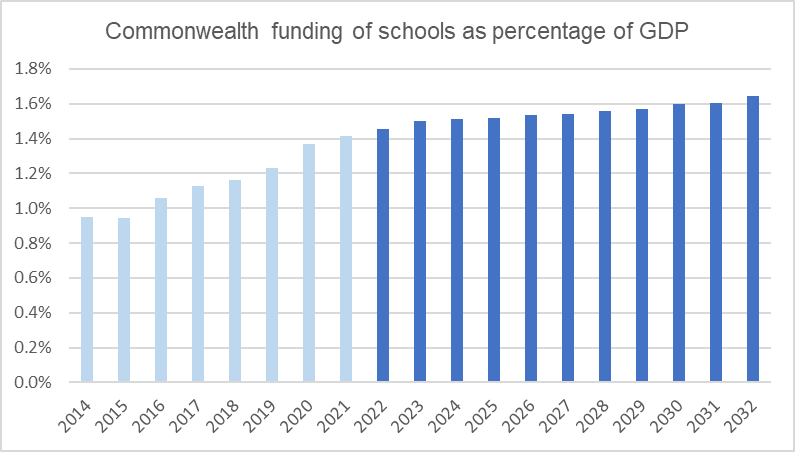
I am a health economist. But when it comes to last week’s federal budget, I really want to talk about education. Why? Because in developed countries, where clean water and sanitation are guaranteed, education is arguably the best investment in public health that can be made.
On an individual level, a good education is a fundamental determinant of health for an entire lifetime. It isn’t only about literacy and numeracy, but also about acquiring basic habits and skills: the ability to reason, emotional self-regulation and interactional abilities — all critical components of a healthy, fulfilling life. But the great thing about education are its positive externalities. Everyone, not just the child, benefits from a good education in a range of ways, including health, productivity and economic growth — a gift that keeps on giving.
Just ask Finland and South Korea. The former was named the happiest country on earth for the fifth year running, despite its long and dark winters. The latter recently surpassed Japan in GDP per capita for the first time ever, and is rapidly closing in on having the highest life expectancy in the world.
The budget was all short-run sugar hits. The few additional investments in areas that pay off over time (housing affordability and paid parental leave) are poorly designed and may end up having the opposite effect to what is intended. But any significant investment in primary and secondary education was wholly absent. The budget papers proudly declare that recurrent funding for schools will continue to increase. Well, of course it will. It always has, in order to keep pace with a growing population and prices. As percentage of GDP, however, the future increases seem a little miserly.

Money matters, but it must be spent where most needed
Does money make a difference? Yes. But more important is how it is allocated across regions, schools and students. The evidence for a causal relationship between funding and achievement is very strong, especially for disadvantaged students. A key factor, and one that’s often understated, is equity — ensuring that all children access a good education from an early age, regardless of their circumstances. A few elite schools won’t make up for lacklustre quality at the other end of the scale. We all suffer if a child misses out on a good education.
Australia seems to have a problem in this regard. We’re good at concentrating disadvantaged kids into disadvantaged schools, and it shows. Average levels of reading, mathematics and science are falling compared to other OECD countries. More importantly, the gap in outcomes is widening, with the average 14-year-old in disadvantaged suburbs showing equal or worse literacy and numeracy than 10-year-olds in more affluent postcodes.
Ten years ago the Gonski review recommended a needs-based model of funding to level the playing field and level up outcomes between schools and postcodes. In health policy this is sometimes called vertical equity — the unequal but equitable treatment of unequals.
The budget did earmark an additional “$29.4 million over 4 years from 2022‑23 to support students in regional and remote Australia”. This is a pittance, especially as recent school funding has basically done the opposite of what Gonski recommended. According to the Productivity Commission, per-student funding of private schools grew five times more than for public school students over the past decade, mostly driven by favourable Commonwealth funding (although it must be said that public school funding by some states has not kept up with inflation). Australia allocates more public money to private education than most other countries.
Public schools in NSW and Victoria are currently 15% to 20% below private schools on the Gonski-recommended resourcing standard. Unless there’s been an unprecedented influx of disadvantaged students into private schools, this is not a good trend. This isn’t putting rifle ranges and equestrian centres in public schools but about putting basic resources like teachers, books and computers, as well as adequate heating and air conditioning, where they are needed. The situation is not only shameful, it goes against our collective self-image and our interest. Helping kids achieve their potential regardless of the circumstances they’re born into is literally how you’d define a “fair go”.
The money is there, we just choose to spend it on other things
We have many emerging challenges: mental health; chronic disease; transitioning to a low-carbon, knowledge economy. Education is one of the best ways to meet these and secure our future. Underinvestment and inequity are a ticking time bomb.
It’s not the fault of this government alone. Both major parties have failed to implement the needs-based funding model when they’ve had the chance. One of the reasons was that it wasn’t possible without cutting funding to some students.
Well, it’s funny how billions can be found for all manner of things of dubious benefit: planes that can’t fly, submarines that may arrive in 30 years, a space force (I can’t even believe I typed that phrase) or handouts to wealthy retirees. Taxpayers subsidise the private health insurance industry to the tune of $10 billion a year — an investment whose public dividend is questionable.
But when it comes to educating our kids, thereby investing in our health and collective prosperity, we must rob Peter to pay Paul. Let’s hope future budgets — federal and state — start to look at this more seriously.








‘We all suffer if a child misses out on a good education.’
I mostly agree with the article, but is written with an assumption we all want the best for everyone. This is false. The government supports the wealthy and privileged in a deliberate pursuit of inequitable outcomes, no matter what the cost to the public good. There are various pyschological studies based on ‘games’ where participants can choose an outcome that benefits everyone a lot, or an outcome that gives them less but puts them ahead of other players. The participants typically chose the latter. It is far more satisfying to see others doing comparitively badly than to see everyone getting ahead together.
The wealthy generally do not believe they lose anything when others are deprived. They do not accept for a moment that they or their family suffers when someone else’s child misses out on a good eduction. They are in control, they want to keep all they have, they want more and they are absolutely determined for their children to be provided every advantage over everyone else. They are pleased to see state schools sunk in squalor, struggling to provide basics and filled with children whose blighted lives are unlikely to ever impinge on the gilded existence they enjoy. This has to be true or we would not run education this way. This is a class war; the Liberals are fighting for the wealthy while Labor has surrendered and left the field.
SSR – you seem to have conflated ‘wealth’ and ‘supporters of this government’ which is probably mostly true, but not entirely – as partly demonstrated by a fairly common commitment across the Independent Voices movement to supporting public education, despite largely arising in wealthy electorates.
I think there’s a nuance to the studies you brought up – it’s not just that people would rather get less as long as other ‘lesser’ people get even less (the Trump voting working class in the USA for example), but that, even where there is strong community spirit and a commitment to fairness and equity, if there is no downside to behaving selfishly and people visibly get away with it then existing community spirit rapidly breaks down – and when you couple this to a natural impulse to fight for the best for your children it’s all too easy for the opponents of decent public education to undermine any community commitment.
In short, people generally have a strong commitment to fairness and equity, but that impulse can readily be turned against itself simply by rewarding selfish behaviour. Which this government is all too happy to do.
I used ‘generally’ to indicate the wealthy are not entirely monolithic in their politics, and I was certainly not saying that all who vote Liberal are wealthy.
The support going to the Independent Voices is a significant development. I do not think it must mean the wealthy supporters believe ‘We all suffer if a child misses out on a good education.’ It’s quite possible some want better state education out a sentimental philanthropic wish to relieve suffering, which is not at all a belief everyone is better off if every child has a decent education.
But I agree with you about the dire consequences of rewarding selfish conduct.
What you describe is generally know as ‘the tragedy of the commons‘ when the unscrupulous take advantage.
However this can only occur when sense of community is broken – usually, but not necessarily, by external forces.
Since 2013 the Liberal National Party govt has wasted over $45 billion on defence procurement due to poor decisions
This govt cannot be trusted to ensure our national security
Liberal have needed to increase Defence Budget to replace the $45 billion they have wasted
Seasprite helicopters – $1.3bn wasted – $3bn to replace
.
Tiger helicopters – $2bn wasted – $4.5bn to replace
.
Taipan helicopters – $2.4bn wasted so far
.
Submarines – $4+bn wastwed and no contract to replace
.
LHD ships plagued with design flaws – $3bn wasted
.
Faulty Light Armour Vehicles fail – $5.6 bn wasted
.
Jet Fighters that cannot outrun, outclimb, out-turn adversaries – $24 bn wasted
The funding of private schools is a travesty. It leads to entrenched privelige and greater inequalities.
The state funding of private schools is a travesty. It’s completely outrageous. However, while private schools entirely funded by their patrons may be undesirable from the point of view of society in general, and Finland’s education system shows excellent results can be achieved by comprehensive state education done properly, there is still an arguable case that those who want to arrange and pay for their own children’s education as they please should be allowed to do so. Even so, you are certainly right, it does typically lead to entrenched privilige and greater inequalities. It is also often used for sectarian religious indoctrination. So maybe the argument against any private education has a certain amount in common with the argument for vaccination mandates, as they both depend on elevating the common good over an individual’s choice.
Sinking Ship Rat makes a lot of sense. Most of us assume the Government will do what its supposed to do namely do the best thing for the people and the country in the long term. In the case of this government that is demonstably incorrect. It works for the billionaires and it knows any educated, thoughtful electorate would throw them into jail for their corruption and certainly never vote for them. Therefore they dont want an electorate that thinks
This brings us to where we are now.
Under this PM the only future the young have is debt as they battle Climate Change and the Morrison Legacy